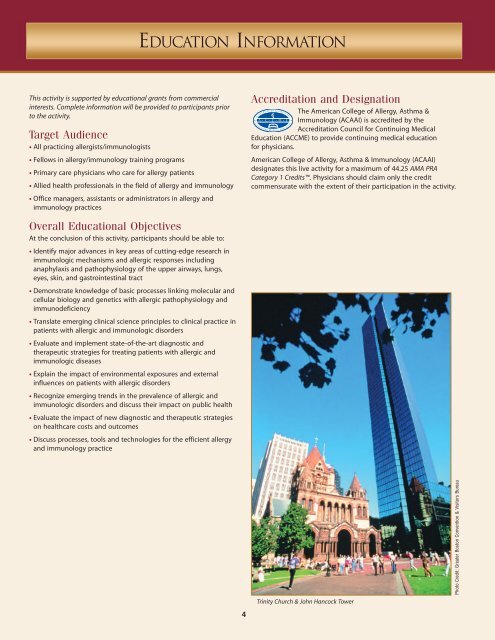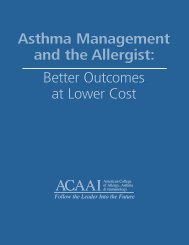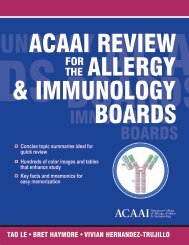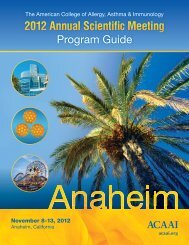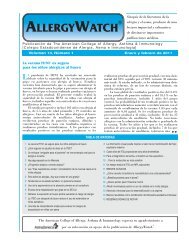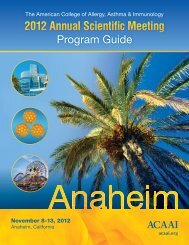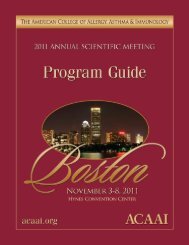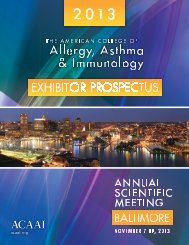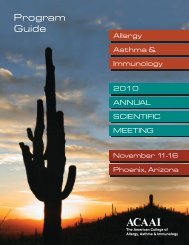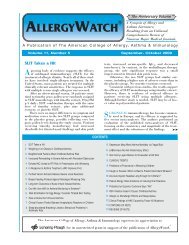EDUCATION INFORMATIONThis activity is supported by educational grants from commercialinterests. Complete information will be provided to participants priorto the activity.Target Audience• All practicing allergists/immunologists• Fellows in allergy/immunology training programs• Primary care physicians who care for allergy patients• Allied health pr<strong>of</strong>essionals in the field <strong>of</strong> allergy and immunology• Office managers, assistants or administrators in allergy andimmunology practicesAccreditation and DesignationThe <strong>American</strong> <strong>College</strong> <strong>of</strong> <strong>Allergy</strong>, Asthma &Immunology (<strong>ACAAI</strong>) is accredited by theAccreditation Council for Continuing MedicalEducation (ACCME) to provide continuing medical educationfor physicians.<strong>American</strong> <strong>College</strong> <strong>of</strong> <strong>Allergy</strong>, Asthma & Immunology (<strong>ACAAI</strong>)designates this live activity for a maximum <strong>of</strong> 44.25 AMA PRACategory 1 Credits. Physicians should claim only the creditcommensurate with the extent <strong>of</strong> their participation in the activity.Overall Educational ObjectivesAt the conclusion <strong>of</strong> this activity, participants should be able to:• Identify major advances in key areas <strong>of</strong> cutting-edge research inimmunologic mechanisms and allergic responses includinganaphylaxis and pathophysiology <strong>of</strong> the upper airways, lungs,eyes, skin, and gastrointestinal tract• Demonstrate knowledge <strong>of</strong> basic processes linking molecular andcellular biology and genetics with allergic pathophysiology andimmunodeficiency• Translate emerging clinical science principles to clinical practice inpatients with allergic and immunologic disorders• Evaluate and implement state-<strong>of</strong>-the-art diagnostic andtherapeutic strategies for treating patients with allergic andimmunologic diseases• Explain the impact <strong>of</strong> environmental exposures and externalinfluences on patients with allergic disorders• Recognize emerging trends in the prevalence <strong>of</strong> allergic andimmunologic disorders and discuss their impact on public health• Evaluate the impact <strong>of</strong> new diagnostic and therapeutic strategieson healthcare costs and outcomes• Discuss processes, tools and technologies for the efficient allergyand immunology practice4Trinity Church & John Hancock TowerPhoto Credit: Greater Boston Convention & Visitors Bureau
MAINTENANCE OF CERTIFICATIONThrough its responsibility to provide quality CME to its membership, the <strong>ACAAI</strong> continues its support <strong>of</strong> the ABAI, which credentialsand evaluates allergy and immunology specialists. Since 1977, ABAI has <strong>of</strong>fered its Diplomates a recertification process to demonstratetheir efforts in continuing education. In 2009, ABAI transitioned to the more comprehensive Maintenance <strong>of</strong> Certification(ABMS MOC © ) program.Linking the education content <strong>of</strong> the <strong>ACAAI</strong> Annual Scientific Meetings to the MOC © program is one way <strong>ACAAI</strong> helps its members provideABAI with evidence <strong>of</strong> their commitment to lifelong learning. Ultimately, CME activities for which MOC © credit is awarded may be crossreferencedto the ABAI examination content outline, available on the ABAI website www.abai.org. Members are encouraged to select areas<strong>of</strong> interest from the program, which will enhance their knowledge <strong>of</strong> state-<strong>of</strong>-the-art allergy/immunology and improve the quality <strong>of</strong>patient care.<strong>ACAAI</strong> will assist <strong>Allergy</strong>/Immunology Training <strong>Program</strong>s with additional curricular resources and assessment measures that may beused to help meet their requirements for assessing competency in the six core areas as designed by the ACGME. The six corecompetencies include:1Patient Care — the ability to provide patient care that is compassionate,appropriate, and effective for the treatment <strong>of</strong>health problems and the promotion <strong>of</strong> health:• data gathering• history taking• patient examination• diagnosis• interpretation/decision-making/assessment• management/treatment plans• preventive care• procedures4Interpersonal and Communication Skills — the ability todemonstrate interpersonal and communication skills that resultin effective information exchange and collaboration withpatients, their families, and other health pr<strong>of</strong>essionals:• teaming and team leadership skills (interpr<strong>of</strong>essional,multidisciplinary)• effective communicator and listener• caring, respectful behavior• written and verbal communication skills• educating/counseling patients and family members• teaching skills23Medical Knowledge — the knowledge about established andevolving biomedical, clinical, and cognate sciences and theapplication <strong>of</strong> this knowledge to patient care:• general principles/concepts/theories• applied basic sciences• applied biomedical sciences• applied clinical knowledge• epidemiology and psychosocial behavioral sciences• population-based medicinePractice-Based Learning and Improvement — the abilityto investigate and evaluate patient care practices, appraiseand assimilate scientific evidence, and improve their patientcare practices:• benchmarks/best practices• practice related quality improvement• evidence-based practice/medicine• continuing pr<strong>of</strong>essional development/continuingmedical education• practice self-assessment• information technology/medical informatics• teaching and learning and lifelong learning56Pr<strong>of</strong>essionalism — reflects a commitment to carrying outpr<strong>of</strong>essional responsibilities, adherence to ethical principles,and sensitivity to a diverse patient population:• physician accountability• humanistic qualities (respect, compassion, integrity)• pr<strong>of</strong>essional ethics• socio-cultural factors (sensitivity to culture, diversity, gender,age, disabilities)• advocacy for and responsive to patient needs• commitment to excellence and quality care• mentorship and role-modelingSystem-Based Practice — an awareness <strong>of</strong> and responsivenessto the larger context and system <strong>of</strong> healthcare, and the abilityto call effectively on other resources in the system to provideoptimal health care:• patient safety• cost-effective care• management <strong>of</strong> resources• medical errors• continuity <strong>of</strong> care• healthcare delivery and systems <strong>of</strong> care models• utilization issues• risk management• electronic record keeping• management and leadership skills5
- Page 1 and 2: REGISTRATION PACKET
- Page 3: HOUSING & GENERAL INFORMATIONHousin
- Page 7 and 8: ANNUAL LITERATURE REVIEW Friday, No
- Page 9 and 10: SYMPOSIA Friday, November 4Rhinitis
- Page 11 and 12: GENERAL SESSIONS Saturday, November
- Page 13 and 14: GENERAL SESSIONS Sunday, November 6
- Page 15 and 16: GENERAL SESSIONS Tuesday, November
- Page 17 and 18: WORKSHOPS Friday & Saturday, Novemb
- Page 19 and 20: WORKSHOPS Saturday & Sunday, Novemb
- Page 21 and 22: WORKSHOPS Sunday & Monday, November
- Page 23 and 24: WORKSHOPS Monday, November 7PLEASE
- Page 25 and 26: ADVANCED PRACTICE HEALTH CARE PROVI
- Page 27 and 28: ALLIED HEALTH PROFESSIONALS COURSES
- Page 29 and 30: ALLIANCE PROGRAMS Friday through Mo
- Page 31 and 32: SOCIAL EVENTS20th AnnualFIT Bowl Co
- Page 33: November 3-8, 2011Plan toJoin Us!85


